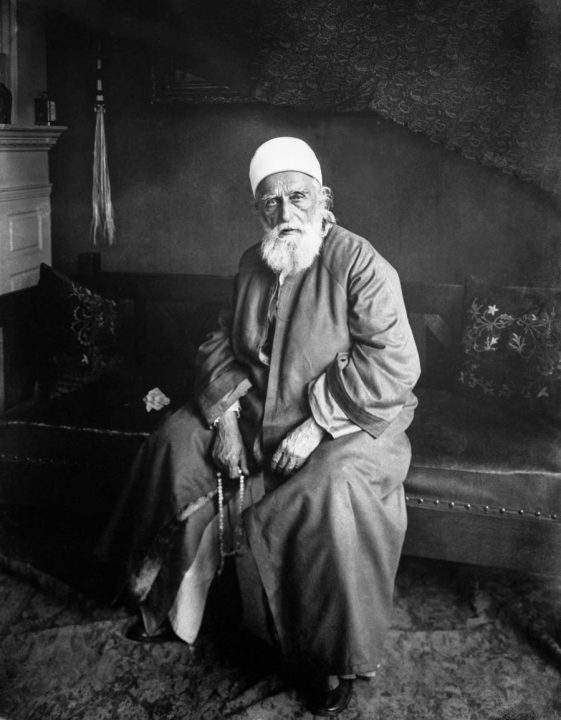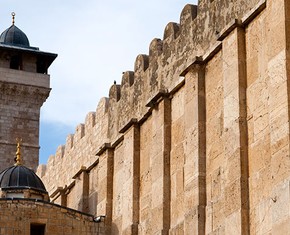The views expressed in our content reflect individual perspectives and do not represent the authoritative views of the Baha'i Faith.
For much of today’s world, spiritual inspiration originally came from the global East. Why? Let’s examine the facts, see if we can find a pattern, and try to understand it.
History demonstrates that many of the major prophets and messengers, the founders of the world’s most widespread beliefs, have emerged primarily from one region of the world—the continent of Asia. Bounded by the Mediterranean on the West and the Pacific Ocean in the East, Asia is loosely comprised of regions some still call the Near East, the Middle East, and the Far East, or refer to as the Orient. Those terms, however, have lost favor primarily because they’re Eurocentric—so for this discussion, let’s just use the generally-accepted name for that region of the world: Asia.
Christianity, currently the world’s largest religion, emerged from Palestine in western Asia. Christ taught his new Faith in the ancient Roman province of Judea, which some now call the Middle East.
Islam, the world’s second-largest faith, began in the cities of Mecca and Medina on the Arabian Peninsula in Asia. Muhammad successfully united the warring tribes of the Arabian Peninsula with his new teachings, which ultimately spread into the rest of Asia, then into Africa and Europe.
Judaism, as you can probably see from the related word Judea, also began in western Asia. The ancient kingdoms of Israel and Judah, where Abraham and Moses were born, have become the national homeland of Jewish people we now know as Israel.
Hinduism, the world’s third-largest Faith, began in the area we now call the Asian subcontinent, which contains the countries of India, Pakistan, Bangladesh, Nepal, and others. Perhaps the world’s oldest large religion, Hinduism, exists today primarily in India and the surrounding region.
Buddhism also originated on the Asian subcontinent that contained ancient India and subsequently spread throughout Asia and the West.
Clearly, then, Asia has served as the birthplace of all of the world’s largest mainstream contemporary religions, including less well-known Faiths and philosophies like Confucianism, Jainism, Taoism, Sikhism, Zoroastrianism and many others.
The Baha’i Faith also began in the global East. First established in the kingdom of Persia in the middle of the 19th century, it quickly spread to other parts of Asia and Europe and then rapidly grew into a worldwide Faith during the 20th century. The world headquarters of the Baha’is in Haifa, Israel is situated there because Baha’u’llah, the Faith’s prophet and founder, was exiled to a prison nearby in 1868 by the Persian and Ottoman authorities, who feared the rapid spread of Baha’u’llah’s progressive teachings.
Every major world religion, then, began in Asia. What makes that region such a fertile birthplace and repository of religions? Scientists, historians, archaeologists, and religious scholars have tried to answer that question for a very long time, and in the process have come up with several theories and explanations.
Perhaps, scholars and historians have ventured, so many religions emerged from Asia because it served as fruitful ground for the earliest known development of written language. Others theorize that the Asian continent, as one of the oldest centers of human civilization and a hub of trade and cultural exchange between so many cultures for so many centuries, intensified the contacts between diverse peoples and thereby contributed to the development of so many different religions. Some mystics simply suggest that because the sun rises in the East, so does spiritual illumination.
The Baha’i teachings mention this phenomena of religions rising in the global East—Abdu’l-Baha, speaking to a Massachusetts audience in talk he gave in 1912, said:
The religions of God have been promulgated, the teachings of God have been spread and the law of God founded in the East. The Orient has always been the center of lights. The West has acquired illumination from the East, but in some respects the reflection of the light has been greater in the Occident. This is especially true of Christianity. Christ appeared in Palestine, and His teachings were founded there. Although the doors of the Kingdom were opened in that country and the bestowals of Divinity were spread broadcast from its center, the people of the West have embraced and promulgated Christianity more fully than those in the East. The Sun of Reality shone forth from the horizon of the East, but its heat and rays are most resplendent in the West, where the radiant standard of Christ has been upraised.
Does all of this mean, however, that the global West has never given birth to a religion? Ponder that question for a moment, and see if you can name a widespread major Faith that began in the Western world—in Europe, Australasia, or the Americas.

Did you think of one? If so, you may have considered the major religious development of Protestantism, which started when Martin Luther nailed his Ninety-Five Theses to the door of a Catholic church in Wittenberg, Germany in 1517. Or you might have thought about the establishment of the Church of Jesus Christ of Latter-day Saints in 1830 in western New York; or maybe the inauguration of the Unitarian Church, which began in 1825 in Baltimore, Maryland.
Those religions and their offshoots, however, each arose out of the teachings of Christ, so they were all originally considered denominations of Christianity.
In another talk he gave in Paris in the early 1900s, Abdu’l-Baha said:
In the past, as in the present, the Spiritual Sun of Truth has always shone from the horizon of the East.
Abraham appeared in the East. In the East Moses arose to lead and teach the people. On the Eastern horizon arose the Lord Christ. Muhammad was sent to an Eastern nation. The Bab arose in the Eastern land of Persia. Baha’u’llah lived and taught in the East. All the great Spiritual Teachers arose in the Eastern world. But although the Sun of Christ dawned in the East the radiance thereof was apparent in the West, where the effulgence of its glory was more clearly seen. The divine light of His Teaching shone with a greater force in the Western world, where it has made a more rapid headway than in the land of its birth.
The absolute primacy of Asia’s religions in our current mental and spiritual landscape, however, has started to erode. Rather than thinking about religion as an exclusively Eastern phenomenon, the world has recently witnessed an upsurge of interest in Indigenous spiritual traditions and practices. Partly because some spiritual teachings “shone with a greater force in the Western world,” as Abdu’l-Baha said, those Indigenous Faiths and philosophies, previously suppressed, ignored, and relatively unknown, have increasingly begun to gain global visibility.
Baha’u’llah wrote in The Book of Certitude, his foundational treatise on the concept of progressive revelation and the inherent relationship between the founders of all Faiths:
Consider the rose: whether it blossometh in the East or in the West, it is none the less a rose. For what mattereth in this respect is not the outward shape and form of the rose, but rather the smell and fragrance which it doth impart.
Purge thy sight, therefore, from all earthly limitations, that thou mayest behold them all as the bearers of one Name, the exponents of one Cause, the manifestations of one Self, and the revealers of one Truth, and that thou mayest apprehend the mystic “return” of the Words of God as unfolded by these utterances.
If we purge our sight from all earthly limitations, we might be able to see beyond the artificial barriers between religions and discern their true connection.
You May Also Like
Comments

















Thank you so much for sharing.
Asia, and particularly the "Middle East" was once quite different from what it is today. It was lush and green, forested and well watered and with the constant energy of the sun it was incredibly productive and therefore, the "cradle of civilization". With the great deltas of the Tigris & Euphrates, the Nile and the Indus and the Ganges, a form of agriculture was developed that gradually spread. The discovery of bronze led ...to two tools that began to turn this procedure into a deadly new problem, however. The plow and the saw led to the destruction of upland forests and mass erosion.